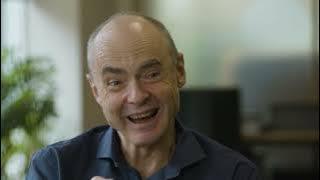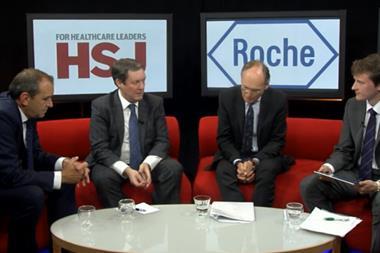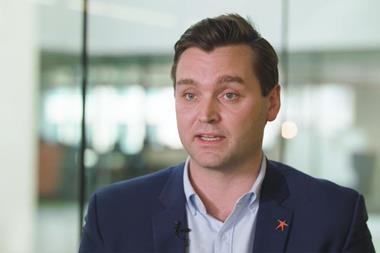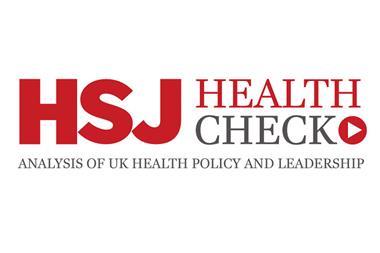In association with

In this video, HSJ editor Alastair McLellan is joined by Alastair Greystoke, professor of precision oncology, Newcastle University, and Richard Simcock, chief medical officer, Macmillan Cancer Support, to discuss the role of precision medicine and biomarkers in cancer diagnosis and treatment.
The episode explores what the future may have in store for earlier cancer detection and more precise treatments, but also the challenges in delivering that vision, such as workforce shortages.
Alastair McLellan
Welcome to the latest Cancer: Project Zero video. One in two people will get cancer at some point in their life, making it the UK’s biggest health burden. As part of Cancer: Project Zero, HSJ has partnered with AstraZeneca to explore the possibility of one day eliminating cancer as a cause of death. We’re conducting that exploration with leading voices from across the UK cancer community. We’re not seeking to set unrealistic expectations, but ask the big questions about how technology, science and other forms of innovation will help us advance towards that ambition. In this episode, I’m delighted to be joined by two of the most important figures in Project Zero. They are Professor Alastair Greystoke, professor of precision oncology at Newcastle University, and Professor Richard Simcock, chief medical officer at Macmillan Cancer Support. Alastair and Richard will be focusing on the role of precision medicine and biomarkers in cancer diagnosis and care. So, Ali, welcome. Tell us a little bit more about the role of biomarkers in cancer diagnosis and care.
Alastair Greystoke
So biomarkers sounds like a very technical term, but all it is is looking at the makeup of cancer. And particularly when we’re talking about biomarkers and cancer, we tend to be talking about genomic changes, so differences, particularly in the DNA, and sometimes RNA, makeup of the cancer. And the reason why that’s important is cancer is individual. So we talk about cancer as this global thing, but actually, cancer arises from an individual’s own cells. It will have the individual’s own DNA in it, and it will have individual changes that have caused a cancer to occur in first place. And that’ll be different for everyone. What we try to do with biomarkers, and what people sometimes talk about precision medicine is work up the exact makeup of somebody’s cancer and look for simple changes where we may be able to develop medicines that could differentially act on the cancer. So kill, ideally kill the cancer cell with limited impact on the patient. It’s very difficult to have no impact on the patients altogether.
Alastair McLellan
Thanks very much. Now, you’ve already mentioned precision medicine. I think there’s often a confusion, Richard, between precision and personalised medicine. I think I’m pretty sure I’m confident that you have some views on that, on that difference. Can you explore that for us and why it’s important?
Richard Simcock
I think it is important, so thank you for raising it. Precision medicine and personalised medicine are often used interchangeably. I think that’s an unhelpful distinction, as Alastair’s explained, precision medicine is about targeting on things, very specific genomic alterations, in a person’s tumor, and I don’t think any of us would wish to be defined by something that had gone wrong inside, some DNA that was trying to harm us. Personalised care is about something that’s very important to me and Macmillan, the charity I work with, about providing holistic care for people with cancer. So personalised care should be about everything that matters to the person, whereas precision medicine is about targeting these genomic alterations to get the best results in cancer treatment. And I think when we conflate those two terms, we risk boiling down an individual with cancer, not the sum of their everything that matters to them and they are, down to some genomic alteration, and that’s anti-holistic. It’s something we should be resisting.
Alastair McLellan
Cancer: Project Zero is about eliminating cancer as a cause of death. That sounds an incredibly ambitious target, but there are, I believe – you would know better – there are various technologies that are coming together which make that an eventual possibility, even possibly a probability. Richard, just give us a sense of is this the right time for trying to achieve that goal, and why is it the right time if it is?
Richard Simcock
I think it is a good time to be thinking about it. We are seeing in our clinical practice, in our daily lives, that things are changing at an exponential rate. We used to think about medical progress as incremental, but there are now. An individual. We can generate gigabits of data from an individual. We now have the mathematical processing power to understand those gigabits of data, and with things like AI, we were able to process them in a meaningful and intelligible way. So these transformations of taking exponential amounts of data and translating them into things that will actually influence a person’s care do create the possibility of actually moving towards the Project Zero goal of the end of death from cancer. So it’s entirely right that we start to think about how it could be made possible, and which of those changes we need to really lean into to try and deliver that goal.
Alastair McLellan
Ali, same question really, but perhaps, how particularly biomarkers, you know, the advances in biomarkers are developing in that direction.
Alastair Greystoke
Yes. So, you know, I graduated in 2000 when we were coming to the end of the whole of the Human Genome Project. And that was, you know, whatever, 10, 15 years of work just to sequence one human genome. We can now analyse the whole genome of a patient, all the genetic makeup, and of their tumor in one, two weeks. And so that’s a superb tool to understand what’s going on. Alongside that we’ve got the therapeutic advances. So we’ve now got computers that can design new drugs in a clever manner, so we don’t have to spend years developing something in a test tube. We can try it out on a computer to see if it works on the cancer and then bring it swiftly to patients. Lastly, I think what’s been really important over the last 10, 15 years is a paradigm shift in how we regard cancer. So it used to be we used to hit it with cytotoxic poisons, X rays, radiotherapy definitely have their place still, you know, these are good treatments. But increasingly, we’ve understood that the cancer is actually a disease of the immune system. Okay, our immune system is supposed to stop cancers forming in the first place. And so by definition, cancers have to learn to hide from our immune system, and they do that in lots of different ways. So, one of the big therapeutic advances we’ve been learning how to target the immune system, to target the individual cancer, and that’s the ultimate precision or personalised medicine. We’re using the patient’s open body. But again, we’re then going to need to have to understand the makeup of the cancer, how it’s hiding from the immune system, so we can modulate a person’s immune system to attack that cancer. And I’m afraid the cancer will always try and escape so we may need to change our treatment. We need to monitor that as well. But I think Richard’s right. We’ve got the tools coming forward. It’s early days, but, you know, compared to how we treated cancer 10 years ago, marked difference, and I think now is the good time to be ambitious and think about Project Zero. We need to be ambitious if we’re going to drive care forward.
Alastair McLellan
So it is clearly a very exciting time for good, sort of solid evidence-based reasons, rather than any just grand ambition or aspiration. But whenever I take part in these conversations, a bit of me is always asking, when, you know? Because I think that that’s what, you know, the future is a long time coming in some cases. You talked about the practice of oncology changing over the last 10 years. I’m assuming that actually you think it will change even faster in the next decade, two decades. Of course, there are many twists and turns, and things don’t always work out as there. But can you give us a sense of how oncology treatment will be different like five 10, what would your sort of milestones be over the next couple of decades?
Alastair Greystoke
Yeah, so, I think one of the key milestones has to be earlier detection, and we’ve already got screening programmes for breast cancer, cervical cancer, and there’s one coming forward for lung cancer. There’s some interesting data, not just ready for real time yet, of what’s called a multi-cancer detection assay, so that’s a blood test. You go to your GP once a year and have a blood test that may highlight that you have cancer, not ready for real time yet, but coming. So the potential to try and pick up cancers earlier, I think, would be a major one. And then
Alastair McLellan
And do you think that’s a sort of that’s a five year type
Alastair Greystoke
Probably 10 years in my opinion. And then the other thing is more precise treatments when we do find people, because the problem at the moment is a lot of our cancer treatments, they’re very good, but they can’t be delivered to all our patient population. Cancer, as well as being a disease of the immune system, is also a disease of old age, and what we’re seeing is older and older patients who may have other health problems, and it then becomes difficult to give some of our therapies at the moment, such as chemotherapies, sometimes even some of our targeted therapies. So kind of treatments, more precise treatments. I’m not just talking about drug treatment here, talking about surgery, robotic surgery, radiotherapy, computer aided radiotherapy, to minimise the dose to normal tissue and yeah, precision medicines to try and work all together with those other modalities to try to get rid of the cancer.
Alastair McLellan
Thank you. Richard, you work in a busy, challenged, as they all are, teaching trust. So the same question to you, really, but I’m also interested in the sort of challenges of changing care models within the cost, resource constrained environment in which you work. And one hand, there’s this massive promise, and on the other hand, there’s the sheer difficulty of getting through your waiting list, etc, and, of course, taking time to change things means, inevitably, to take some attention away from the day-to-day stuff.
Richard Simcock
Yeah, and there’s a great old quote, isn’t there, which speaks to the future’s already here, it’s just not evenly distributed. In my practice, I have people treated for metastatic breast disease, who in a previous era, sadly we would have expected to die already, and they have not. So we think they are surviving in the long term. That creates what I would call cancer’s good problem because I am having to treat them still. They attend every three weeks for antibody therapy that requires that’s a growing resource implication. For the people, those people need psychological and emotional support because, at the moment, we’re labeling them as treatable but not conventionally curable. So this is an accretion of work capacity. As we build more and more therapies in, we grow more and more treatment problems. So my own trust, our systemic therapies capacity for breast cancer, we’ve doubled attendances. We went up 106 per cent over a decade with a matching 5 per cent increase in staff. Now that’s a good problem – new drugs, new therapies, better outcomes – but the challenge of delivery has been extraordinary. So the NHS is doing what it does best, which is innovating under pressure. So we’re designing new ways of delivering service in the best way we can. So delivery of therapies at home, giving patients autonomy over their own therapy. So many antibody therapies can be delivered by patients in their own home by themselves because, believe me, they care more than anyone else that it’s done properly. But these are service improvements that are being sweated out of us because we’re under a significant amount of pressure. What I would really like is a little bit of headroom to take stock, look at the brilliance that’s happening in pockets around the UK, and say, how do we get that innovation and spread best practice to everybody so we can adopt these good practices for everybody, and we minimise unwanted variations in care and see everyone get access to these good therapies.
Alastair McLellan
So far in this conversation, we’ve focused on the very exciting and positive side of the changes that are going to come in oncology care. As a journalist, of course, that’s a very uncomfortable place to me, and I like talking about bad news much more than I like talking about good news. So let’s talk about the difficulties side of things. Richard, what are the risks that we face that will stop us progressing as fast as we can towards the no cancer deaths goal?
Richard Simcock
So, first of all, you need the data, and the data requires a research infrastructure, and a research infrastructure is under challenged when, whenever funding is threatened. So we would like research to be prioritised and delivered at pace. And obviously we would like that research to be done in the population in which we serve. So it’s better if that research is done in local populations and not outsourced from other geographies. It’s probably applicable, but we’d like a good quality research infrastructure in this country that allows us to deliver treatment at pace. Then that research then needs to link into a regulatory framework that actually approves those drugs at pace and a cost effectiveness framework like NICE that actually there isn’t a NICE blight that we see data… Alastair and I will both be at the big annual bun fight, which is the ASCO conference, where we’ll see fabulous data of new drugs and when we see the evidence that it works, we want to be able to deliver that to our patients in the UK as quickly as possible. And that requires regulatory and cost effectiveness frameworks to work at pace to make sure it meets those thresholds. And then the biggest challenge I see in my work every day is, I would think the number one pressure in the NHS right now, which is workforce. Who are the workforce to deliver this? And some of the treatments, particularly the things that Alastair told me, require a highly specialist workforce, so particularly around genomic, processing those results, understanding those results, delivering them. And in some of the more exciting therapies – so for example, CAR-T cell therapies, actually the technicians and biomedical scientists required to design and deliver them. So not only the workforce that we’re used to, oncologists, nurses, and a whole new raft of biomedical expertise that these genomic advances require.
Alastair McLellan
Same question to you, Ali.
Alastair Greystoke
Yeah, Richard came up with a lot of the points that I would have done. I would pick up on two points. So, number one, pathology. So pathology is one of the workforces that is under most strain but is vital if we’re going to work out the underlying structure of the cancer, so they need to take the biopsies, look after it, send it for appropriate genomic testing, and then integrate the results back into the picture to guide the clinician. And there’s just not enough of them around, and they don’t have the education or the equipment or the expertise to do it in many cases. Pockets of excellence, as Richard said earlier, but lots of areas where they’re really struggling to deliver. That’s leading to long waits for people to get the results they need to guide treatment, and during that time, for some cancers, so I treat lung cancer, patients will deteriorate to the point where they can’t even have treatment. So that’s number one big problem. Second problem is, Richard talked about NICE and, you know, cost effectiveness. The problem is so the NHS is very well set up for populations. So we’ve got guidelines – you know, this is how you treat somebody with lung cancer – but we’ve already talked about how these are individuals, and we’re not good at that and NICE is not good at that. It cannot deal with individual cases. So how do we move from the data generated in big clinical trials of 100, 200 patients to having appropriate funding in a cost-effective manner for the patient in front of me and their evolving cancer.
Alastair McLellan
One last set of questions I want to finish by focusing, as we should, on the patient. I wonder if we might think five years, five, 10 years forward, assuming things go well, and the barriers that you’ve discussed are overcome in some kind of way. Perhaps, Ali starting with you, you can talk about how, as the patient experiences a patient’s journey through cancer diagnosis into care, might, you know, look and feel different. Give us a vision of five to 10 years in the future.
Alastair Greystoke
So, I think, at the moment, as if we as cancer doctors, we tend to treat things very much as a static thing. You know that the cancer is where it is at diagnosis, and we don’t watch the evolution over time. So what I think increasingly is we’ll have almost like an interactive timeline of the patient’s cancer and the patient, as Richard said, that’s probably most important thing, what treatments they’ve had, how the cancer has changed in its genomics, how it’s evolved, how we’ve adapted the treatment, and then hopefully how the patient’s come out the other side and we can enable them to be cured of their cancer – I don’t get to use that word often enough in my practice – and hopefully not have too many long-term effects of their cancer where they can go off and lead a relatively normal life and contribute to society.
Alastair McLellan
So we’re talking about people being diagnosed earlier, so when the treatment starts, their cancer isn’t as bad. And then their treatment being shorter is it?
Alastair Greystoke
Yeah, I think that’s where I really like to see it. I’m afraid at the moment, unfortunately, we’re at this position where we’re driving to more complex and longer treatment, but hopefully there will be a tipping point, and we are already doing studies, for example, with immunotherapies, where, at the moment, we’re giving every three weeks, as Richard said, and we’re giving it for two years, or maybe even longer. Do we need to do it that often? You know, can we give less frequent treatment with less impact on the patients? Less side effects, more time for holidays, more time to work, you know, less impact on their lifestyle.
Alastair McLellan
So, Richard, you get the final word. Give us your vision of the future.
Richard Simcock
So to build on what Alastair’s said, I think, first of all, as treatment becomes more complex, if we are going to partner with people with cancer and proper shared decision making, if we’re going to have less paternalistic, less hierarchical models of care, that’s a big ask when therapies become so much more complex. So the education and information and support piece for people with cancer becomes far more complex. Helping citizens understand the complexity of modern cancer care will be a really important part of making those citizens feel like they understand what is happening to them. That’s a big challenge. But I’d probably finish by saying that, whatever happens with cancer care, there are things that have always been true, that I think will always remain true, which the person diagnosed with cancer is going to be frightened. They’re going to be scared. They’re going to be worried about themselves. They’re going to be worried about the people around them, and they will always need holistic wraparound information and support and care that we have been traditionally very good at providing, but we’ll never need to forget that, regardless of how precision we get.
Alastair McLellan
Okay, thank you, Richard. Thank you, Ali. Thank you very much. Fascinating conversation. Thank you for joining us on the latest episode of the video series for AstraZeneca’s Cancer: Project Zero. We’ve explored the role of both personalised care and precision medicine. We hope this discussion has inspired you to play a part in building a future where zero people die from cancer. Stay tuned for further episodes and more insights for oncology leaders.
The views expressed are those of the individuals and not those of AstraZeneca or any other organisation
To find out more about AstraZeneca’s Cancer: Project Zero campaign, click here.
Topics
WATCH: Is precision medicine the future of modern cancer care?

Welcome to the first video in our series, created in collaboration with AstraZeneca for Cancer: Project Zero.
 Currently
reading
Currently
reading
WATCH: Is precision medicine the future of modern cancer care?
- 2
- 3
- 4







































